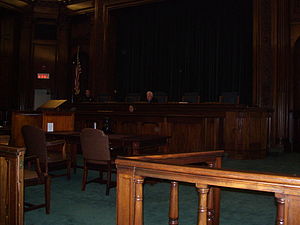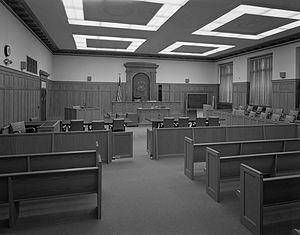- Bar (law)
-
For professional organizations of lawyers, see Bar association.
Bar in a legal context has three possible meanings: the division of a courtroom between its working and public areas; the process of qualifying to practice law; and the legal profession.
Contents
Courtroom division
 The bar (railing) at the Rhode Island Supreme Court
The bar (railing) at the Rhode Island Supreme Court
The origin of the term bar is from the barring furniture dividing a medieval European courtroom, similarly as the origin of the term bank for the location of financial transactions in medieval Europe. In USA and in Europe and many other countries referring to the law traditions of Europe, the area in front of the barrage is restricted to participants in the trial: the judge or judges, other court officials, the jury (if any), the lawyers for each party, the parties to the case, and witnesses giving testimony. The area behind the bar is open to the public.[1] This restriction is enforced in nearly all courts. In most courts, the bar is represented by a physical partition: a railing or barrier that serves as a bar.[2]
License and certification
The bar may also refer to the qualifying procedure by which a lawyer is licensed to practice law in a given jurisdiction.
U.S. procedure
Main article: Admission to the bar in the United StatesIn the United States, this procedure is administered by the individual U.S. states. In general, a candidate must graduate from a qualified law school and pass a written test: the bar examination. Nearly all states use the Multistate Bar Examination, usually with additions for that state's laws. The candidate is then admitted to the bar. A lawyer whose license to practice law is revoked is said to be disbarred.
British procedure
Main article: Call to the BarIn the United Kingdom, the practice of law is divided between solicitors and barristers (advocates in Scotland). It is the latter who appear in court. When a lawyer becomes a barrister, he is called to the bar.
The legal profession
The Bar commonly refers to the legal profession as a whole. With a modifier, it may refer to a branch or division of the profession: as for instance, the tort bar, lawyers who specialize in filing civil suits for damages.
In conjunction with bench, bar may differentiate lawyers who represent clients (the bar), from judges or members of a judiciary (the bench). In this sense, the bar advocates and the bench adjudicates. Yet, judges commonly remain members of the bar; and lawyers are commonly referenced as Officers of the Court.
The phrase bench and bar denotes all judges and lawyers collectively.[2]
See also
- Admission to practice law
- Admission to the bar in the United States
- Bar Association
- Bench (law)
- British Accreditation Council
- Call to the Bar
- Courtroom
References
- ^ Garner, Bryan, ed. (2004). Black's Law Dictionary, Eighth Ed.. St. Paul, MN: West Publishing. pp. 157–8. ISBN 0314151990.
- ^ a b Walker, David (1980). Oxford Companion to Law. Oxford University Press. pp. 112, 123. ISBN 019866110X. http://books.google.com/?id=4GgYAAAAIAAJ
Law Core subjects 
Other subjects Abusive language · Admiralty law · Aviation law · Banking law · Bankruptcy · Commercial law · Competition law · Conflict of laws · Consumer protection · Corporate law · Energy law · Entertainment law · Environmental law · Family law · Financial regulation · Human rights · Immigration law · Intellectual property · International criminal law · Labour law · Military law · Music law · Procedure (Civil · Criminal) · Product liability · Space law · Sports law · Tax law · Unjust enrichment · WillsLegal systems Canon law · Civil law · Common law · Chinese law · Halakha · Roman law · Sharia · Socialist law · Statutory law · XeerLegal theory Critical legal studies · Comparative law · Economic analysis · History · International legal theory · Philosophy · SociologyLegal institutions Categories:- Courts
- Court systems
Wikimedia Foundation. 2010.

